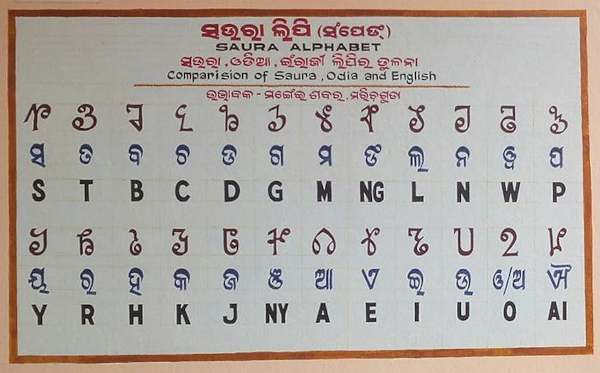.
Sora, also known as Saura, is an indigenous language spoken, according to the 2011 Indian Census, by about 409,549 people in parts of the eastern Indian state of Odisha and the neighbouring state of Andhra Pradesh. Latin and Odia alphabets are used for Sora along with Sorang Sompeng, and its limited usage is partly explained by the competition with those two majority writing systems.
The Sorang Sompeng or Sora Sompeng alphabet was originally invented by Malia Gomango in 1936. His son-in-law Mangei Gomango was instrumental in promoting it by setting up a letterpress which produced many books.
The alphabet has been used primarily in religious contexts, and that is still the case for those who practice the traditional Sora faith. But as many Sora speakers converted to Christianity and Hinduism over time, and the Bible and other religious texts were translated using Latin and Odia, Sorang Sompeng was gradually sidelined.
In 2012, the alphabet gained a boost by its inclusion in Unicode, a universal encoding standard that allows seamless and cross-platform use (unlike predecessor encoding standards, such as ASCII).
Also in 2012, Salma created her first typeface for Sorang Sompeng, which is now broadly used in print and digital publications despite its low overall adoption.
She hopes her new typeface, which will be available in November 2020, will boost the use of this alphabet among native speakers even more.
Most indigenous communities such as the Sora are under-resourced; only a few can count with experts like Salma. Efforts such as hers help communities to preserve oral knowledge in written form and use the internet to exchange knowledge in their own languages.
Source: Globalvoices
You may also like
-
India Can’t Afford to Remain Stagnant at this Juncture, Says PM Modi; Asks People to Buy Locally-Made Goods
-
Stolen Artefacts to be Returned to India from Scotland Museums
-
Netaji’s Hologram Statue at India Gate
-
10th Century Stone Idol of Goat Head Yogini IllegallyRemoved from A Temple in Lokhari, Banda, UP Being Returned to India
-
UNESCO Inscribes ‘Durga Puja in Kolkata’ on the Representative List of Intangible Cultural Heritage of Humanity
